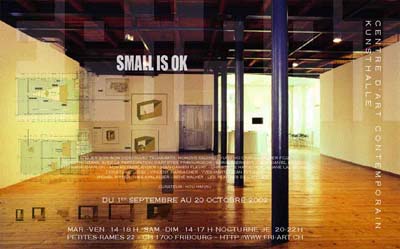 Small is OK Atelier Bow-Wow (Yoshiharu Tsukamoto, Momoyo Kaijima), Yung Ho Chang / Atelier FCJZ Tsuyoshi Ozawa with the participation of: Boris Baeriswyl, Francis Baudevin, Jean-Daniel Berclaz, Stéphane Dafflon, Adrian Fahrländer, Jean-Damien Fleury, Christiane Hamacher, Eliane Laubscher, Christiane Lovay, Vincent Marbacher, Yves Marti, Jean Pythoud, Michel Ritter, Sarah Glaisen, Nika Spalinger, Stefano Török, René Walker, Les Peintres de l’Atelier We are living in the time of bigness. Bigness is perhaps the most worshiped fetish. […] Like the limitless expansion of global economy, "think big" and "act big" are probably the strongest signs of our time. However, bigness is by no means the safest way of life. Instead, it can fall into unsolvable crisis. The most evident symptom is the current collapse of the transnational capitalist system marked by the downturn of the stock market and fear of "the war of civilisation". In this moment of crisis, it’s actually better to be small, to think and act small. Because to be small can help us remain flexible, preserving a certain freedom of imagination and creation. It can help us look at the world […] with critical eyes. Small is OK, and it can also be better. The smaller the better. […] Small is OK… and it is perhaps the way to be really great. Living in the biggest metropolis in the world, namely Asian cities, more and more architects and artists have understood this dialectic relationship between the big and small. They have created small projects to negotiate with the biggest and the most drastic mutation of urban space and society. Yung Ho Chang/Atelier FCJZ from Beijing, Atelier Bow-wow (Toshiharu Tsukamoto, Momoyo Kaijima) and Tsuyoshi Ozawa from Tokyo, among many others, have been working on small but highly original and effective projects as responses to the urban condition of Asian cities, marked by their extremely high density and rapid changes. Yung Ho Chang and his office Atelier FCJZ have been proposing solutions to solve the pressure of high density by introducing the concept and strategy of "Micro-urbanism" in their architecture design and collaboration with artists. Atelier Bow-wow have been focusing their analysis of Tokyo’s urban conditions on "pet houses", or "the smallest buildings in the world", and translate them into their own designs. Tsuyoshi Ozawa has developed a global network of Nasubi Galleries, or the smallest galleries created by artists from different parts of the world with the typical Japanese milk box. In fact, they have formed the biggest gallery in the world because they are endlessly spread across the globe… For the project in Fri-Art, they have all proposed site specific works to respond to the local condition that is centred on smallness: a small space for contemporary art in a small city of a small country with a small budget and little time. Yung Ho Chang/Atelier FCJZ is building a house including the most basic functions such as living, dining, sleeping and washing. The house, having the most minimalist form – rectangular, is gradually getting smaller and smaller. It’s divided into four parts and set up in four rooms of the space in order to provide new spaces, between the real and the virtual, for other artists’ interventions. Atelier Bow-wow’s "Manga Pod", an igloo-like bookshelf-cellular originally designed for the public to read Manga books (comic books), the most popular Japanese publication, will be inserted into the structure of the house and provide a space for the public to read and exchange books, the section of studying. Tsuyoshi Ozawa continues to develop his global network of Nasubi Galleries by inviting artists from Fribourg to create new projects for these small milk boxes. Obviously, collaborations with the local art community, and therefore, dialogues with the public, are integrate parts of all three projects proposed by these three groups of artists/architects from Asia. […] This kind of conversation and collaboration, "small", intimate, by intelligent, is both physical and cultural. This forms the very centre of the whole project itself. At this specific moment and place, they all believe: Small is OK. (Hou Hanru, curator) Ausstellungsdauer: 1.9. - 20.10.2002 Öffnungszeiten: Di-Fr 14 - 18 Uhr, Sa/So 14 - 17 Uhr Do 20 - 22 Uhr nocturne FRI-ART Centre d'Art Contemporain Petites-Rames 22 1700 Fribourg Telefon 026 323 23 51 Fax 026 323 15 34 E-Mail fri-art@culture.mcnet.ch www.fri-art.ch |